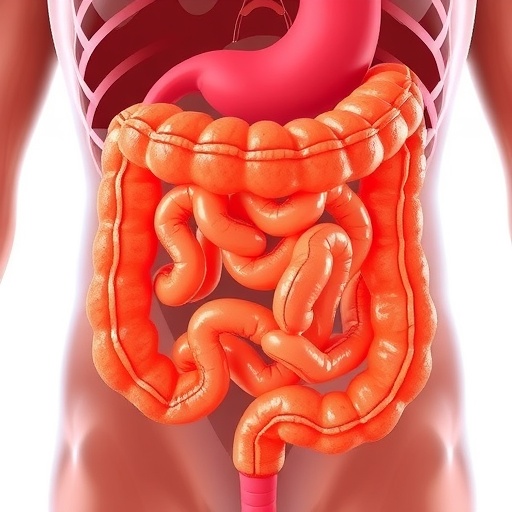In a groundbreaking study published in Cell Death Discovery, researchers have unveiled compelling evidence that colorectal cancer cells harness fructose metabolism as a critical component of their survival and proliferation strategies. This revelation marks a significant shift in the understanding of cancer metabolism, which has traditionally emphasized glucose as the primary fuel source for tumor growth. The implications not only deepen our comprehension of colorectal cancer biology but may also pave the way for novel therapeutic interventions.
The scientific inquiry, led by Sica et al., delves into the metabolic nuances that distinguish malignant colorectal cells from their normal counterparts. For decades, the Warburg effect—characterized by enhanced glucose uptake and fermentation to lactate even in the presence of oxygen—has been the cornerstone of cancer metabolism research. However, this latest investigation disrupts this paradigm by demonstrating that fructose, a simple sugar commonly found in the human diet, is extensively metabolized within colorectal tumor cells, suggesting an alternative or complementary bioenergetic pathway.
What makes this discovery particularly striking is the identification and quantification of key proteins and enzymes involved in fructose metabolism within tumor tissues. Using state-of-the-art proteomics and metabolomics techniques, the authors reported elevated expression of fructose transporters such as GLUT5 and key enzymes like ketohexokinase (KHK), which catalyzes the phosphorylation of fructose. These molecular insights underscore the metabolic flexibility of cancer cells, emphasizing how they adapt their nutrient uptake mechanisms to exploit available resources efficiently.
Functionally, the metabolism of fructose in these cells appears to fuel processes beyond mere ATP production. The research data show that fructose-derived metabolites feed into anabolic pathways, supporting nucleotide synthesis, lipid biosynthesis, and redox balance—cornerstones for rapidly dividing cancer cells. This multi-faceted utilization of fructose metabolics underscores the sugar’s role in sustaining the biosynthetic demands of colorectal tumors and maintaining cellular homeostasis under stress conditions like hypoxia or nutrient scarcity.
Remarkably, experimental models further confirmed the physiological relevance of these molecular observations. Xenograft mice implanted with colorectal cancer cells demonstrated increased tumor growth rates when fed diets enriched with fructose. Conversely, inhibition of fructose metabolism through pharmacological blockage of KHK led to substantial suppression of tumor progression, validating fructose metabolism as a potential therapeutic target.
Delving deeper into the mechanistic underpinnings, the study explored how fructose metabolism intersects with signaling pathways governing cell proliferation and apoptosis. It appears that fructose metabolism modulates key oncogenic pathways such as PI3K/Akt and mTOR, which are known regulators of cellular growth and survival. This intertwining of metabolic flux and signal transduction networks exemplifies the complexity of cancer biology and highlights potential vulnerabilities that could be exploited pharmaceutically.
At a broader level, this study challenges the conventional wisdom that primarily implicates glucose in the metabolic rewiring of cancer cells. The findings argue for a more inclusive model of cancer metabolism that integrates diverse nutrient sources. Since fructose consumption has increased dramatically in Western diets, especially through high-fructose corn syrup in processed foods, this research invites a reevaluation of dietary factors in colorectal cancer etiology and progression, potentially influencing public health policies.
The methodological rigor of the research is noteworthy. Combining in vitro assays, sophisticated metabolic tracing using isotopically labeled fructose, and in vivo models, the authors present a comprehensive and convincing case for fructose’s role in cancer metabolism. High-resolution mass spectrometry elucidated the fate of fructose carbons across metabolic pathways, providing an unprecedented mapping of metabolite fluxes within tumor cells.
Intriguingly, the study also uncovered heterogeneity within colorectal cancer subtypes in terms of their reliance on fructose metabolism. Some tumors exhibited a predilection for fructose uptake and processing, while others appeared more dependent on traditional glucose pathways. This heterogeneity suggests potential stratification markers for predicting the efficacy of metabolic-targeted therapies, moving towards more personalized oncology approaches.
The clinical implications of these findings extend to the development of diagnostic tools. Non-invasive imaging techniques that detect fructose uptake, analogous to PET scans used for glucose visualization, might emerge as novel modalities to identify aggressive tumors or monitor therapeutic response. Additionally, the expression levels of fructose metabolism-associated proteins could serve as prognostic biomarkers for colorectal cancer progression.
Importantly, this study also raises questions about the metabolic interplay between cancer cells and the tumor microenvironment. Since fructose availability and metabolism might influence not only cancer cells but also stromal components like fibroblasts and immune cells, understanding this crosstalk could unveil new dimensions of tumor biology and resistance mechanisms.
From a therapeutic standpoint, the study amplifies interest in developing inhibitors targeting fructose metabolic enzymes like KHK or fructose transporters such as GLUT5. Given the differential reliance of cancer versus normal cells on these pathways, selective targeting might minimize off-target effects, enhancing the safety profile of such interventions.
Moreover, the research underscores the potential synergy between metabolic inhibitors and conventional chemotherapeutic agents. By restricting critical nutrient pathways like fructose metabolism, cancer cells may become more vulnerable to existing treatments or immune-mediated destruction, offering a multi-pronged attack on tumor viability.
As the field moves forward, further investigations are warranted to validate these findings across larger patient cohorts and diverse populations. Longitudinal studies correlating dietary fructose intake with tumor fructose metabolism and clinical outcomes will be crucial to translate these molecular insights into meaningful patient care strategies.
In conclusion, the compelling evidence presented by Sica and colleagues heralds a paradigm shift in our understanding of colorectal cancer metabolism. The identification of fructose as a significant metabolic substrate challenges long-standing dogmas and opens promising avenues for research, diagnosis, and treatment. This discovery not only enriches the molecular landscape of cancer biology but also spotlights the intricate relationship between nutrition and malignancy, highlighting the complexity and adaptability of cancer cells in their relentless quest for survival.
Subject of Research: Colorectal cancer metabolism, specifically focusing on fructose metabolism in tumor cells.
Article Title: Evidence of fructose metabolism in colorectal cancer.
Article References:
Sica, G.S., Bischof, J., Funke, L. et al. Evidence of fructose metabolism in colorectal cancer. Cell Death Discov. 11, 464 (2025). https://doi.org/10.1038/s41420-025-02745-w
Image Credits: AI Generated




